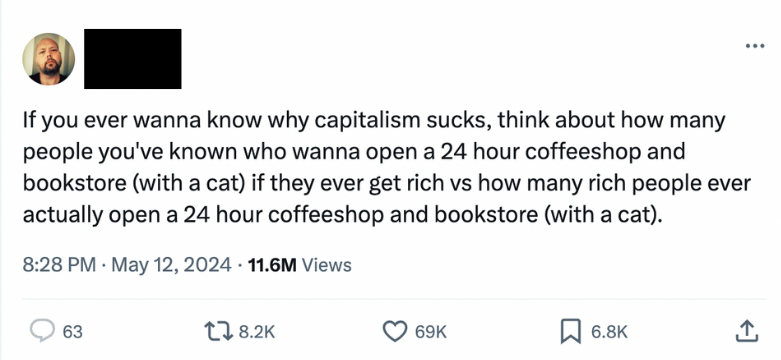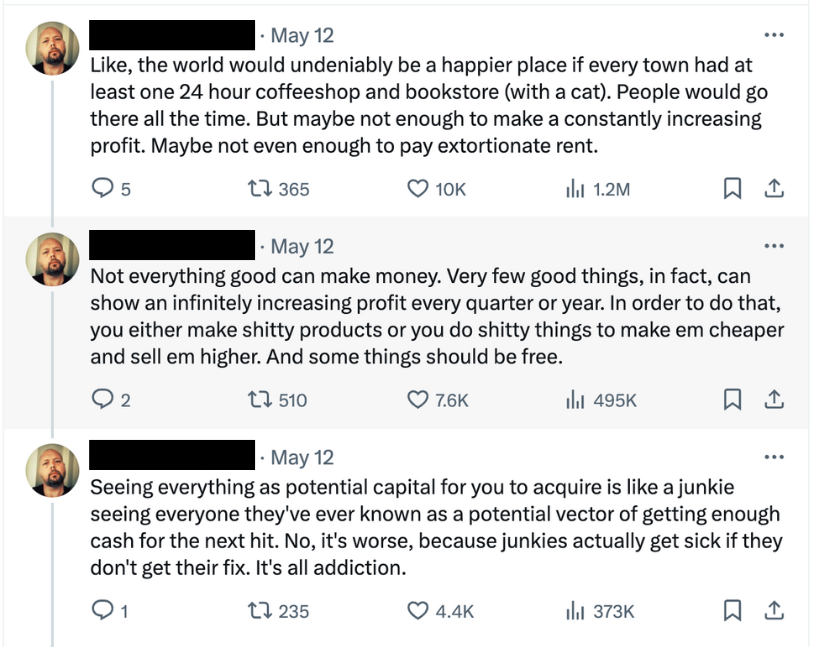Why Profits Help Society
On these pages I typically delve into the economics of money, banking, and life insurance, but sometimes it’s fun to go back to basics. In today’s post, I’ll react to a viral tweet from someone castigating the evils of capitalism.
Specifically, this fellow thought it was self-evident that every town should have a 24-hour coffeeshop and bookstore (with a cat), and as of my screenshot, some 69,000 people agreed with him.

Although it may seem frivolous, I actually think this is a good springboard for me to explain the social function of profits and losses. Or in other words, why it’s a good thing that business owners care about “the bottom line.”
Let the Man Speak
Before I attempt to answer our friend, let’s let him elaborate on his perspective:

Now that we’ve allowed the critic to spell out his problems with capitalism, please allow me—author of The Politically Incorrect Guide to Capitalism, available in fine bookstores everywhere—to rebut his objections.
Resources Are Scarce
The fundamental flaw in the critic’s worldview is that he fails to appreciate the significance of scarcity. Simply put, it would be incredibly wasteful if every city had a 24-hour bookstore and coffee shop. And the primary waste would be the labor of the workers who had to keep it staffed at all hours, even when it when it was dead empty at 3:30am on most nights.
So we see that for this man’s dream to become a reality, it’s necessary for a group of workers to take turns manning the store in shifts. That definitely benefits the rest of society, many of whom, we can stipulate, would indeed prefer to live in a city that had a 24-hour bookstore and coffeeshop. But it definitely hurts the people who need to watch this very same 24-hour bookstore and coffeeshop, and to be responsible for keeping it clean, restocking the napkins, and keeping the coffee fresh. That would take a lot of manpower to keep it operational at all times.
Of course, our critic of capitalism wasn’t committed to enslaving the people manning the bookstore. (I’m not calling them “employees” because this analysis would be true in a socialist arrangement too.) He would want them to be paid (or rewarded if you prefer that term) for their work.
So what that means is that the rest of society would no longer view the existence of the bookstore as an unmitigated benefit. Now there would be an explicit material cost: The rest of society would be effectively striking a deal with the potential bookstore-workers. Namely, the rest of society would take some of its output—of both goods and services—and trade it to the workers for their labor, toiling away at the bookstore/coffee shop. If we assume no coercion is involved, then the bookstore workers only agree to this arrangement if their alternative role in the machinery of society was inferior, as judged by each of the bookstore workers. Obviously each worker would have to agree that this new arrangement was preferable to his original niche in the social division of labor, otherwise it wouldn’t really be a voluntary change in his task.
The Problem With Socialism
The above analysis showed that if we want to move from our status quo into a social arrangement that supports a 24-hour bookstore and coffee shop, then we need to—at the very least—convince a subset of workers that they should voluntarily change what they are doing. To the extent that this persuasion involves the offer of more goods and services produced by everyone else, we can conclude the following:
Suppose there is a subset of workers, called W, who stop what they are currently doing as a job, and switch over to manning the 24-hour bookstore. Further suppose that in making this transition, the amount of the total social output awarded to group W is higher than in the status quo. Then that means the social output generated by the workers who moved to the bookstore, must be greater than they generated at their previous niche. If it is not, then the society-minus-group-W is clearly made worse off (on average) by the change in occupation. Therefore, to ensure the reshufflings of labor benefit society in general, we would like a social system that approves of changes that satisfy some metric of “net increase in output.”
I won’t spell it out here, but our discussion leads into Ludwig von Mises’ critique of socialism. Without market prices for the “means of production,” the central planners would have no way of evaluating—even ex post—whether their Economic Plan actually made economic sense. There would be no objective way of determining whether the central planners should have tweaked where some iron ore was sent, and how many acres were devoted to this crop versus that crop. In a modern economy, there are trillions of decisions that must be carried out monthly which shape the future of that society. It is profit and loss, double-entry bookkeeping that provides the intellectual tools to steer this ship.
Conclusion
The reason we don’t maintain legions of 24-hour bookstore/coffee shops is that it would be incredibly wasteful, most obviously with the human labor hours but also the scarce real estate that could be devoted to other uses, as well as the electricity and heat / AC.
I imagine our critic above thinks modern accountancy is a rigged scorecard that overlooks the planet, social justice, the needs of unborn citizens, etc. But whatever its shortcomings, profit-and-loss accounting helps business leaders guide their enterprises in economical ways. Yes, there other are attributes one might want out of leaders, but capitalism keeps them profitable, and that’s actually a socially beneficial disciplinary process. It provides a safety filter before any individual is entrusted with scarce resources, including all of our productive time.
NOTE: This article was released 24 hours earlier on the Infinite Banking (IB) 3.0 - The Future of Finance Group
Dr. Robert P. Murphy is the Chief Economist at infineo, bridging together Whole Life insurance policies and digital blockchain-based issuance.
Twitter: @infineogroup, @BobMurphyEcon
LinkedIn: infineo group, Robert Murphy
Youtube: infineo group
To learn more about infineo, please visit the infineo website
Tags:
Economics



Comments